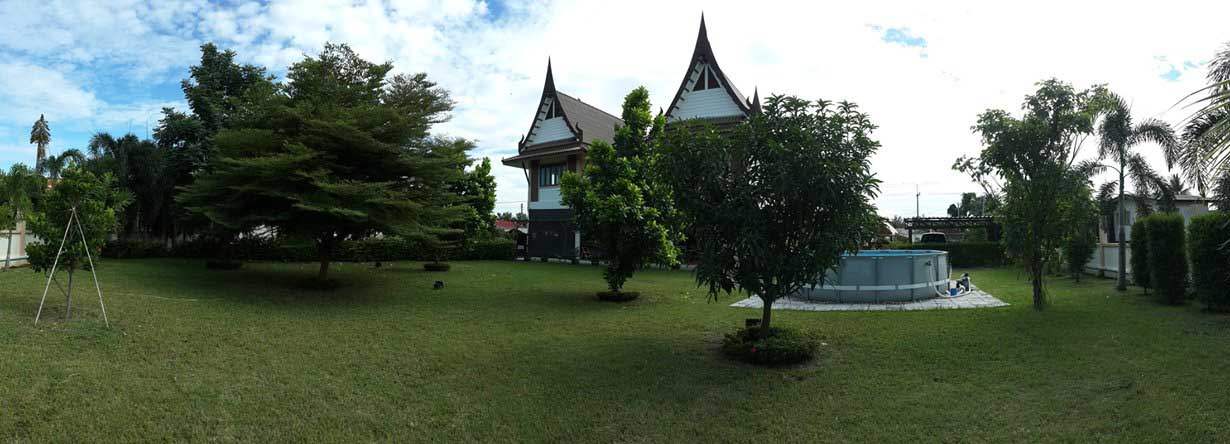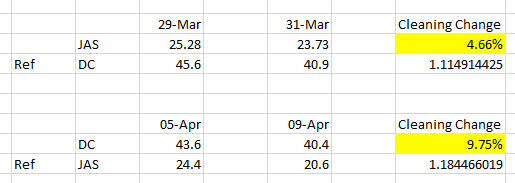-
Posts
46,453 -
Joined
-
Last visited
-
Days Won
2
Content Type
Events
Forums
Downloads
Quizzes
Gallery
Blogs
Everything posted by Crossy
-
Or a wiring error on the CT or your wiring. What settings did you change? Great that it's working as intended. Which Sofar inverter do you have?
-
Yup, it's time to at least disable export on your solar then go hybrid with an Energy Storage System (ESS). Have you tried offering to sell your exported energy to the estate? This of course assumes they know how to configure / read the meter correctly.
-
... and that was the women
-
OK I'll get in before anyone else. They will be looking to unload rather more than just cash!
- 18 replies
-
- 10
-

-

-
Yes, Madam insists on old season hom-mali. I now know how to identify the relevant stuff and get plus-points when I get home ????
-
Task A is to get the BTU ratings of the units they have installed and verify that they fit within the standard Thai guesstimate of 500-700 BTU / m2 of room space. If they do you will be unlikely to get much further I'm afraid. Also, note that it's been VERY warm recently pretty well every A/C, even correctly sized, would be struggling to get anywhere near 21C. EDIT You may be able to shuffle units around in the house and only shell for one or two actual replacements.
-
I don't like basmati rice, so I don't buy it, I suggest our OP does the same with jasmine rice. Easy. Many moons ago, I was working on a project in Malaysia. We had a British software engineer visit on a fairly long-term basis, let's call her Sarah (because that was her name). She was on a bit of a health kick and couldn't find suitable brown rice in the two aisles of rice in the supermarket. Asking about it in the office she was directed to the local animal feed outlet. I never did find out if she actually bought any.
-

New house build - electrical system inspection
Crossy replied to unheard's topic in The Electrical Forum
You may wish to investigate an "Ufer ground" (after Herbert G. Ufer) or "concrete encased electrode". I'm quite surprised that these earthing methods are not common/permitted in Aus. Our building steel (which is contiguous from roof structure into the driven piles) actually measures rather better than the 2.4m (ish) rod using my rather antique, but still functional earth resistance tester. Which probably explains the minimal damage incurred when we took a direct lightning hit to our roof. It's important to understand that, like building regulations, electrical regulations tend to be tailored to local conditions (wet, dry, hot cold etc. etc.) and do not necessarily transfer well between locations. That said, AS3000 is a pretty good match for Thai conditions and methods, but, of course, cannot over-ride the local regs. -
If your CT is in the right place and "Export" is set to 0% then the only variable is if the CT is the right way round. With all your load turned off and no-export enabled your meter should not be moving. If it is moving, swap the CT connections, re-start the inverter and check again.
-

New house build - electrical system inspection
Crossy replied to unheard's topic in The Electrical Forum
At the sharp end We didn't get our 2.4m in all the way (using an SDS hammer and adaptor) so just cut off the top so the cover would fit on the earth pit. Not a word was said by the inspector. If you use the "regulation" exothermic weld to attach the cable any marking will be obliterated anyway. -
I'm still a member of "Wiltshire Young Farmers", does that count?
-

New house build - electrical system inspection
Crossy replied to unheard's topic in The Electrical Forum
I've never heard of anyone being rejected coz they have clamps (we do). -
I posted this in one of the other "electricity bill through the roof" threads. The red column is our overall usage. Our habits haven't changed, A/C at the same temperature, but the usage is up by 30%. This is purely due to the A/C and fridge/freezers working harder, it's hot people! There is a slight saving in not using the water heater due to the "cold" water being almost too warm for a shower. The swimming pool is like a bath.
-

PEA and Solar how low can you go?
Crossy replied to MJCM's topic in Alternative/Renewable Energy Forum
Do let us know what transpires. -

PEA and Solar how low can you go?
Crossy replied to MJCM's topic in Alternative/Renewable Energy Forum
Definitely time to ask PEA. -

How clean are your solar panels?
Crossy replied to 007 RED's topic in Alternative/Renewable Energy Forum
Myself and @JAS21 repeated our earlier "controlled" experiment with cleaning, similar results to last time. A 10% increase in the corrected output (equivalent to 4kWh per day for us) is definitely worth the effort of cleaning the panels. -

PEA and Solar how low can you go?
Crossy replied to MJCM's topic in Alternative/Renewable Energy Forum
Time to ask PEA methinks ???? -

PEA and Solar how low can you go?
Crossy replied to MJCM's topic in Alternative/Renewable Energy Forum
Yeah, 1125 is the standard domestic type. Could be they swapped the meter for some reason. I'd wait for the next bill and see what it looks like. -

PEA and Solar how low can you go?
Crossy replied to MJCM's topic in Alternative/Renewable Energy Forum
Is it possible you've changed from a "construction supply" to a permanent supply? Or maybe have a Time Of Use (TOU) meter? What number is in the "Type" box near the top of the bill? -

Resort Owner Shocked As Power Bill Soars Over 700,000 Baht
Crossy replied to webfact's topic in Eastern Thailand News
Fixing a leaky pipe for Madam over-rides all other tasks! -

Resort Owner Shocked As Power Bill Soars Over 700,000 Baht
Crossy replied to webfact's topic in Eastern Thailand News
I've not done any research other than a quick look on Lazada, so I can't really recommend any particular unit. Sorry. -

Resort Owner Shocked As Power Bill Soars Over 700,000 Baht
Crossy replied to webfact's topic in Eastern Thailand News
It would come back on whilst you were feeling around for the light switch In these days of interconnected everything I'm sure some enterprising individual could come up with a "smart" system with interlinked door and window sensors, occupancy sensors and a time of day reading, throw in some AI to make an educated guess as to whether there was someone in there or not. -

Resort Owner Shocked As Power Bill Soars Over 700,000 Baht
Crossy replied to webfact's topic in Eastern Thailand News
Occupancy sensors work pretty well https://www.lazada.co.th/products/220v-800w-microwave-sensor-pir-occupancy-body-motion-detector-light-switch-i2653378457-s9541413294.html To work an A/C this one would need a contactor, but not difficult or expensive. They do have some downsides: - Many moons ago an engineering company decided that they could save on energy by fitting occupancy sensors in the lavatories. These would turn out the lights when nobody was in there. Unfortunately, the time out in the men's room was just a little too short and sometimes the lights went out when you were in a stall. The solution was to open the stall door and wave at the sensor. All fine and dandy until one fateful day the elderly lady cleaner happened to walk in just as a young engineer was waving at the sensor with his trousers round his ankles. The cleaner survived the experience and the sensors were disabled. I wonder who that young engineer was





